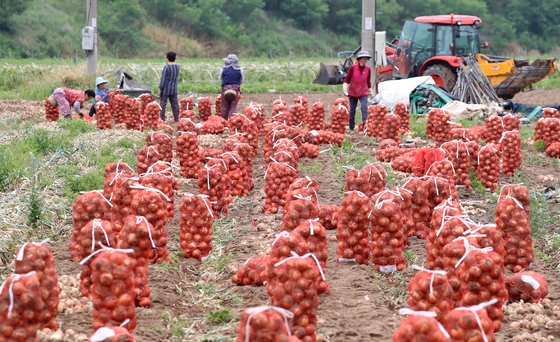Farm, fish workers going illegal in large numbers
![Farmers harvest onions in Dalseong County in Daegu on June 8. The owner of the onion farm said that there are worries over a shortage of foreign workers during harvesting season and increased labor costs. [NEWS1]](https://koreajoongangdaily.joins.com/data/photo/2022/10/04/83e33ed9-beea-4e43-b5e0-abe1ca331449.jpg)
Farmers harvest onions in Dalseong County in Daegu on June 8. The owner of the onion farm said that there are worries over a shortage of foreign workers during harvesting season and increased labor costs. [NEWS1]
Nearly 20,000 foreigners who came to Korea to work on farms or in fishing villages have overstayed their visas and gone illegal.
Data from the Ministry of Justice and Ministry of Employment and Labor showed that as of August, a total of 17,772 foreigners who came to Korea for such work have become illegal immigrants. Of these, 17,320 came on non-professional employment permits and 452 were on the seasonal worker program.
From the start of 2019 to August, 4,174 such workers walked away from their legal jobs, according to the data compiled by Rep. Yoon Joon-byeong, a lawmaker from the Democratic Party (DP) and a member of the parliamentary agriculture and fisheries committee.
Of the workers who went illegal since 2018, 2,364, or 56.6 percent, started in the agriculture and livestock industry, and 1,810 in the fishing industry.
By region, 1,016 workers were initially based in South Jeolla, 669 in Gangwon, 457 in South Chungcheong and 425 in North Jeolla.
Foreign migrant workers on non-professional employment permits can stay in the country for three years with the possibility of extensions.
The seasonal worker scheme allows local governments to invite people from overseas to legally work in farming and fishing villages for 90 days.
Rural areas have faced a shortage of local labor because of the declining and aging population. Pandemic travel restrictions that began in 2020 led to a big drop in foreign workers.
“Because migrant workers who have been employed in the agricultural and fisheries sector leave without permission,” Rep. Yoon said, “the shortage of labor for farmers is getting worse.”
Yoon suggested a joint supervisory system that could better supervise foreign workers involving government agencies such as the Ministry of Justice, Ministry of Employment and Labor, Ministry of Agriculture, Food and Rural Affairs and the Ministry of Oceans and Fisheries.
“In order to prevent foreign workers from leaving jobs without permission, it is necessary to eliminate the possibility of broker intervention in advance and to improve their working environment,” said Yoon. “In particular, rather than entrusting management to local governments, a system should be established so that management and supervision can be carried out at the pan-government level.”
BY SARAH KIM [kim.sarah@joongang.co.kr]




















